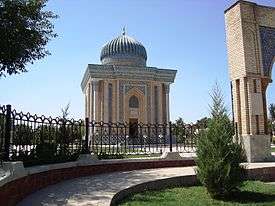Muhammad Zahid al-Kawthari
Muhammad Zahid b. Hasan al-Kawthari (1296 AH – 1371 AH/1879–1952) was the adjunct to the last Shaykh al-Islam of the Ottoman Empire, a Hanafi Ash'ari scholar and a polymath.[2]
Muhammad Zahid al-Kawthari محمد زاهد الكوثري | |
|---|---|
| Personal | |
| Born | 1296 A.H. = 1879 A.D. |
| Died | 1371 A.H. = 1952 A.D. |
| Religion | Islam |
| Nationality | |
| Region | |
| Denomination | Sunni |
| Jurisprudence | Hanafi |
| Creed | Ash'ari[1] |
| Main interest(s) | Aqidah, Kalam (Islamic theology), Fiqh (Islamic jurisprudence), Hadith studies, Shari'a (Islamic law), Sufism, Literature |
| Notable work(s) | Maqalat al-Kawthari, Mahq al-Taqawwul fi Mas'alat al-Tawassul, Al-Lamadhhabiyya Qantarat al-Ladiniyya |
| Muslim leader | |
Influenced by
| |
Influenced
| |
Overview
He was born in 1879 in Düzce, now in Turkey (back then in the Ottoman Empire), to family of Circassian descent.[3] After the fall of the Ottoman Empire, the Kemalists began a violent crackdown on the religious scholarly class. Fearing that his life maybe in danger, Kawthari fled to Cairo, then to Syria and finally returning to Cairo. There, he edited classical works of Fiqh, Hadith and Usul, bringing them back into circulation. In particular, he wrote short biographies of prominent personalities of the Hanafi school of thought.[4]
A staunch Maturidi, he held a critical view of Medieval dogmatist Ibn Taymiyya.[4] Kawthari was one of the teachers of Moroccan scholar Abdullah al-Ghumari, who would later go on to become one of Kawthari's most prominent detractors.[5]
Scholarly works
- Bulugh al-Amani fi Sirat al-Imam Muhammad ibn al-Hasan al-Shaybani - a short biography of Imam Abu Hanifa's student who would compile the Zahir al-Riwaya.
- Al-Fara'id al-Wafiya fi `Ilmay al-`Arud wa al-Qafya - (The Abundant Peerless Matters in the Two Sciences of Prosody and Rhyme)
- Fiqh Ahl al-`Iraq wa Hadithuhum: Originally an introduction to Nasb al-Raya, it was published separately with Shaykh Abdul Fattah's footnotes
- Hanin al-Mutafajji` wa Anin al-Mutawajji`- a poem on the horrors of World War I.
- Al-Hawi fi Sira al-Imam Abi Ja`far al-Tahawi - a biography of Imam Al-Tahawi
- Husn al-Taqadi fi Sira al-Imam Abi Yusuf al-Qadi - a biography of Imam Abi Yusuf al-Qadi.
- Al-Istibsar fi al-Tahadduth `an al-Jabr wa al-Ikhtiyar - (The Obtainment of Insight Concerning Determinism and Freedom of Choice).
- Maqalaat ul Kawthari - a collection of his articles.
- Tafreed 'ala I'laa As-Sunan li-Ashraf Ali Thanwi wa Zafar Ahmad 'Uthmani
Creed
In Muqaddimatu-l-Imaam Al-Kawthari, he wrote that in general, Ash'ari was less inclined than Maturidi to reconcile between reason and transmitted texts he considered the Maturidi code of theology is a middle path between reason and the transmitted texts. Al-Ash'ari did not give much preference to reason in the presence of sacred texts, even if they were transmitted by lone narrators (khabar abad) rather than through uninterrupted transmission (tawatur) while Maturidi would attempt to reconcile between reason and the transmitted text (manqul), as long as it was possible to do so without too much difficulty or without sacrificing fairness. This slight difference in methodology did not produce any substantial discrepancy in their theological precepts, but indeed served only to make the existing theological discourse all the richer.
Al-Kawthari was inclined to the Ash'ari creed because of his preference to being more inclined towards the sacred texts more than reason, even though he was a Hanafi in matters of Fiqh.
In his obituary to Shaykh 'Abd al-Fattah Abu Ghuddah, Mufti Muhammad Taqi Usmani wrote that Imam Al-Kawthari was an Ash'ari in matters of theology while being a Hanafi in matters of jurisprudence.
Recent translations of Kawthari's work
Mufti Muhammad Anwar Khan Qasmi, a Deobandi scholar, has recently translated many of his works into Urdu and published them in Indian academic journals and magazines. For example, al-La Madhhabiyya Qintarat al-La Diniyya, an article Kawthari wrote equating non-conformism to irreligiousness, was translated by Qasmi with extensive footnotes and introduction by him and published by Deoband Islamic Research and Education Trust in 2013 under the title of Ghayr Muqallidiyyat: Ilhad Ka Darwaza. Also, Qasmi translated Kawthari's extensive introduction to Imam Ibn `Asakir's Tabyin Kadhib al-Muftari, published by the same Center in Deoband in 2013, under the title of Islami Firqe: Eik jaiza. Mr. Anwar Qasmi also translated and edited in Urdu one of his great books called Fiqh Ahl al-`Iraq wa Hadīthuhum: Originally an introduction to Naṣb al-Rāyah, which was published separately with Shaykh ʿAbdul Fattāḥ's footnotes. On the same pattern, other books of al-Kawthari like min ʿIbar al-Tārīkh fi al-Kayd lil-Islam, and his introduction to the book al-Asmā wa al-Sifāt of imam Bayhaqī, and al-Kawthari’s footnotes on Dhahabi’s Bayan Zaghal al-Ilam were also edited and translated my Mr. Qasmi and published from the same Center in Deoband.
See also
References
- Haddad, Gibril Fouad (29 April 2000). "IMAM AL-KAWTHARI". Retrieved 17 June 2020.
- "Al-Kawthari".
- Muntasir Zaman, The Life and Thought of Imām Zāhid al-Kawtharī
- "Those Who Attack Al-Kawthari".
- Gibril Haddad, The Ghumari School. 6 December 2002: Living Islam. Last updated 2 June 2003.
